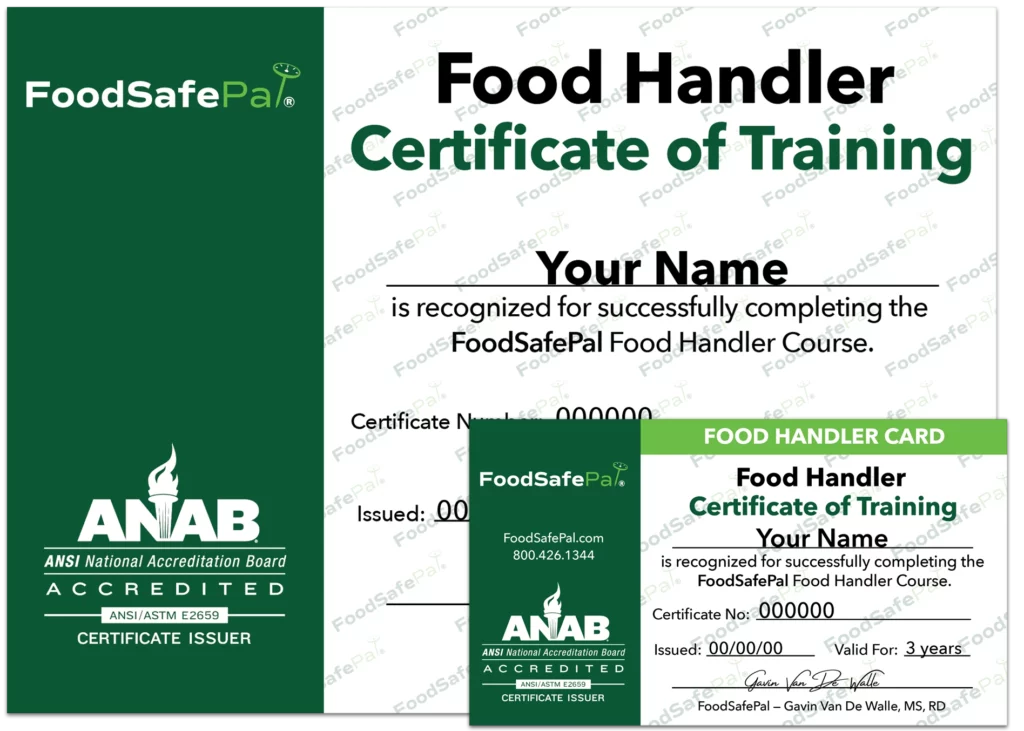Do Servers Need a Food Handler Card?
As a server, you attend to customers before, during, and after their meals.
You may also be responsible for wrapping silverware and bussing tables.
However, because you don’t directly handle or prepare food like the back of the house, you may wonder whether you need the same food handler training as them.
This article explains whether servers need a food handler card, and if so, how to earn one.

Do you need a food handler card as a server?
A food handler is generally defined as a foodservice employee who works with unpackaged food, food equipment or utensils, or food-contact surfaces.
Servers fit the definition of a food handler because they handle utensils and food-contact surfaces like plates and clean linens.
Bartenders, dishwashers, and baristas also fit the definition of a food handler.
Servers must also know which menu items contain common food allergens so they can help guide customers away from problematic dishes, as well as communicate with the back of the house about any food allergies a customer may have to prevent cross-contact while preparing the dish.
Cross-contact is the transfer of a food allergen such as wheat or egg from one surface or food to another.
Because performing the responsibilities of a server requires a basic understanding of food safety to prevent contamination that can lead to a foodborne illness, many states and counties require servers or wait staff to earn a food handler card.
And even if the state or county in which you work does not require a food handler card, many restaurants have a strong food safety culture and still require it of their servers.
Summary
Because servers or waitstaff meet the definition of a food handler, many states and employers require them to earn a food handler card before or within a certain period of employment.
How to get a food handler card as a server
A food handler card — also known as a food handler certificate — proves that you have successfully completed a food safety course.
You might be able to receive food handler training in person, but most people prefer online training due to its convenience and ease.
To get started, enroll with a valid online training provider, like FoodSafePal.
Most places only accept ANSI-National Accreditation Board (ANAB)-accredited food handler training courses, like FoodSafePal’s.
Earn or Renew Your Food Handler Card in 90 Minutes
Trusted by thousands. The fastest, most reliable way to meet your health department’s requirements.

However, some health departments only accept food handler cards they issue.
After enrolling, you can begin right away.
Learn about basic food safety topics such as:
- how food hazards occur and spread
- good personal hygiene and handwashing
- cross-contact and cross-contamination prevention
- cleaning and sanitizing procedures
- pest prevention
As a server, pay close attention to the information about good personal hygiene, handwashing, cross-contact and cross-contamination prevention, and cleaning and sanitizing procedures, since these are most relevant to your job.
After you complete the course, you must pass a multiple-choice test to assess your knowledge of the topics covered to earn your food handler card.
From start to finish, you can learn and test in as little as 90 minutes.
Your food handler card will be good for three years from the date you earn it, but, depending on where you work, you may need to renew it sooner.
Either way, renewing your food handler card regularly keeps you current and fresh on important food safety principles.
Summary
To earn your food handler card as a server, enroll with a valid online training provider like FoodSafePal, complete the course, and pass the test.
The bottom line
Because servers fit the definition of a food handler, many states, counties, and employers require them to earn a food handler card.
To do so, enroll with a valid online training provider like FoodSafePal, complete the training, and pass the test.
Earn or Renew Your Food Handler Card in 90 Minutes
Trusted by thousands. The fastest, most reliable way to meet your health department’s requirements.

Pay close attention to the information about good personal hygiene, handwashing, cross-contact and cross-contamination prevention, and cleaning and sanitizing procedures, since they are most relevant to your job as a server.
Your food handler card will be good for three years, but you may need to renew it more often.






